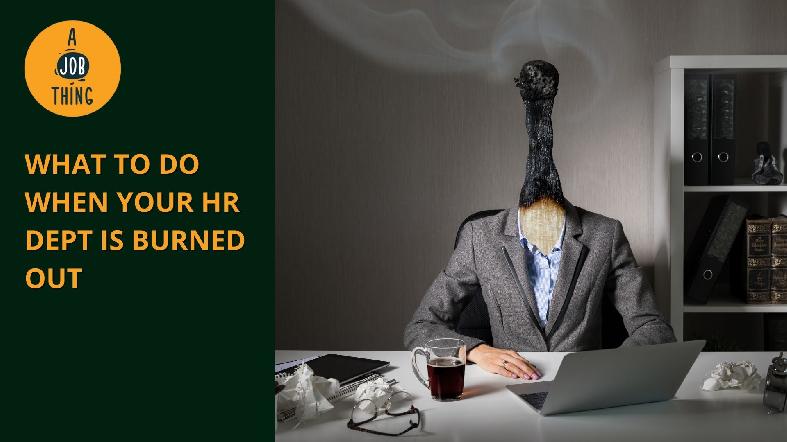
What to Do When Your HR Department Is Burned Out
Are You Hiring?
Find candidates in 72 Hours with 5+ million talents in Maukerja Malaysia & Ricebowl using Job Ads.
Hire NowCompanies now realise that, in addition to the Great Resignation, their remaining employees are suffering from another crisis: the Great Burnout.
The stress of the pandemic has taken a heavy toll on many employees, and HR personnel have been particularly pressured. During the pandemic, they were tasked with responsibilities that no one else in the organisation would want to take on.
They had to become the bearer of terrible news with pandemic-related retrenchments. Now, in the middle of the Great Resignation, HR departments are straining the dwindling candidate pool to fill openings to ensure their companies survive.
In many cases, the burden is on HR staff to provide emotional support to other employees while lacking the means or training to do so and the capacity to seek similar help when needed.
HR Burnout
The stress of having to execute so many tasks for which they were not equipped has resulted in widespread burnout within HR departments.
According to a report by Workvivo, 98% of HR personnel say that they feel burned out. Also:
-
97% say that their job has pushed them to feel emotionally exhausted,
-
88% say that they dread work,
-
73% say they do not have the resources and tools to perform their job well,
-
Only 29% believe that their company values their work.
Given all of this, it's not surprising that 78% would contemplate quitting their current job for a better one.
Companies must know that their HR personnel are vulnerable in such a scenario. Not only is it possible to leave the organisation, but they can also succumb to the plethora of health issues linked with long-term elevated stress, such as depression, insomnia, high blood pressure, and anxiety.
Leaders can check for the following symptoms of burnout among their HR employees:
-
Deliverables are often late,
-
Reduced effectiveness and performance in their positions,
-
A negative shift in humour,
-
Inability to respond to feedback and other forms of communication, and
-
They are generally less communicative,
What can employers do to assist, empower, and retain their HR personnel amid this crisis?
1. Allow them a seat at the table.
HR professionals have the worst of both worlds. They are required to perform many of the most challenging activities in a business while having no say in developing policies or making choices that affect them.
Organisations gain an understanding of their reality, hear their thoughts, and perhaps design better policies that are based on HR support by allowing them to participate in executive meetings.
The HR personnel will feel respected, more invested in working hard under policies they helped design, and more inclined to stay.
2. Introduce wellness training.
When done correctly, wellness training and programmes work. According to an Udemy survey, 48% of employees say company-sponsored wellness initiatives are essential in helping them manage stress. They also have a positive impact on general health and job happiness.
3. Allow flexible working hours and work from home arrangements.
Life has been hectic for many families and allowing employees to select their work hours rather than imposing fixed work days and times that may not be appropriate for them can help ease stress and boost productivity.
Similarly, allowing employees to work from home at least part of the time can help minimise work-related stress.
What can HR professionals do to reduce stress?
Unfortunately, not every company will respond appropriately to the HR problem, leaving HR employees to seek solutions to manage burnout independently.
HR professionals who are experiencing burnout must change course before the issue worsens. Burnout can have major consequences for both physical and mental health.
Keep an eye out for the following symptoms of burnout:
-
A sense of defeat, failure, and helplessness,
-
Feeling isolated and unsupported,
-
Unable to feel satisfied or have a sense of accomplishment,
-
Lacking motivation,
-
Increased pessimism and negativity,
-
Feeling tired all the time,
-
Oversleeping or insomnia,
-
Increasing anxiety levels, and
-
Feeling depressed.
HR professionals can begin including the following practices in their routines:
1. Delegate with zeal.
One must be able to rely on team members, and understand that they do not have to accomplish everything alone. This will help to reduce workplace stress.
2. Request assistance.
It's typically considered a badge of honour among HR professionals when individuals come to them for assistance rather than the other way around. However, communicating with superiors to let them know you're suffering from your job or feeling overwhelmed is a critical first step toward finding a solution.
3. Include wellness techniques such as mindfulness and meditation in your daily routine.
4. Get enough rest.
Sleep deprivation has major consequences for productivity, emotions, and health.
5. Maintain a nutritious diet.
Food heavy in saturated fat and sodium, as well as excessive caffeine, sugar, and alcohol consumption, can all have a negative impact on mood, energy levels, and rest. Eating a well-balanced diet can help enhance both mental and physical health.
6. Engage in physical activity.
Exercise increases the synthesis of the good hormones that cause emotions of wellbeing, satisfaction, and happiness. It also boosts the immune system. Find a physical activity that you enjoy, bonus marks for activities that allow you to get some fresh air.
The HR problem is yet another victim of the pandemic, but it also allows businesses to reconsider their values and how their work environment and practices affect their people.
Source: SHRM Blog

